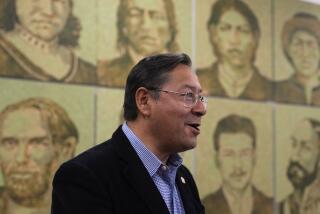Philippine Coup Attempt Seen as Embarrassment for Administration
- Share via
WASHINGTON — The latest coup attempt in the Philippines was a blow to the Reagan Administration policy that had held out the Manila government as the very model of a Third World democracy, but U.S. officials were encouraged that most of the army and national police remained loyal to President Corazon Aquino.
Although President Reagan once was considered a strong supporter of Ferdinand E. Marcos, the Administration embraced Aquino’s “people power” revolution that ousted Marcos 18 months ago and since then has cited the Philippines as a major example of the way that democracy can prevail over dictatorship.
Earlier this summer, Secretary of State George P. Shultz said the Philippine example was so important to the cause of freedom around the world that “every man is a Filipino.”
So the attempt by dissident army officers to oust Aquino in what proved to be the bloodiest coup attempt in Philippine history came as an embarrassment to the Administration. However, officials said Aquino and her top military leaders deserve high marks so far for the way they have put down the rebellion.
State Department spokeswoman Phyllis Oakley attempted to minimize the impact of the coup attempt.
“In any transition like this (from dictatorship to democracy), there are difficulties ahead,” Oakley said. “But we once again reaffirm our support for Mrs. Aquino and her government.”
Lugar Urges More Aid
U.S. officials said they were unclear about the motivation of the mutineers. But they said they are confident that Marcos did not play an active role from his exile home in Hawaii.
Sen. Richard G. Lugar (R-Ind.), who as chairman of the Senate Foreign Relations Committee played a key role in lining up U.S. support for Aquino when she took power in February, 1986, said the coup attempt apparently resulted from the internal politics of the Philippine armed forces.
Lugar urged the Administration to increase military aid to the Philippines as a way to improve military morale and to turn the army’s attention to the fight against Communist insurgents.
“We know the score there,” Lugar told a press conference. “The problem is whether we’re going to act upon it.”
He described the Philippines as a “showcase of American democracy.” As such, he said, Washington should make support of Philippine democracy a top priority instead of “simply hoping that it will continue and expressing shock from time to time when newspapers indicate that a coup attempt has occurred.”
Richard Fisher, an Asian studies analyst at the conservative Heritage Foundation, agreed with Lugar that the United States should make good on earlier promises of increased military assistance to Manila. That, he said, would help to rally the army behind Aquino.
“The main challenge to Aquino is not to suppress the military as a result of the coup attempt,” he said. “She must actively campaign for their loyalty to contain a very serious Communist threat.”
Goals Unclear
It is not entirely clear what the mutineers had hoped to gain. Without at least tacit U.S. backing, a non-Communist regime would have little opportunity of consolidating power in the Philippines, most analysts believe.
Robert Barnett, a former State Department Asia expert now on the staff of the Carnegie Endowment for International Peace in Washington, speculated that the coup leaders were trying to “take the temperature” in Washington to find out if they could obtain U.S. backing. If so, they apparently were disappointed.
“I’m pro-Aquino, I’m pro-democracy,” Barnett said. “I don’t think it is fair to expect that whole dynamic to be trouble-free.”
Nevertheless, Barnett said that Aquino’s troubles in the Philippines could prove to be bad news for democratic opposition forces in South Korea. Opponents of South Korea’s authoritarian President Chun Doo Hwan have cited the ouster of Marcos in the Philippines as an example of a stable and democratic alternative to dictatorship.
“If the lesson of Aquino is that there are shortcomings in democracy, a lot of people who might otherwise favor putting the heat on Chun Doo Hwan’s establishment may start arguing: ‘Look at the Philippines, you just can’t push these guys.’ I don’t agree with that, but some will make that argument.”
More to Read
Sign up for Essential California
The most important California stories and recommendations in your inbox every morning.
You may occasionally receive promotional content from the Los Angeles Times.













